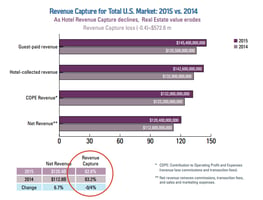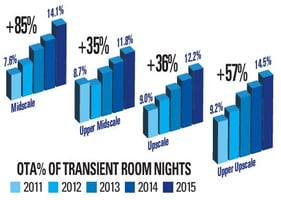By: Cindy Estis Green, CEO & Co-Founder, and Matt Carrier, Director of Revenue Strategy & Account...
Blog
Demystifying the Digital Marketplace: Implications for the European Marketplace
By: Cindy Estis Green, CEO & Co-founder
Featured in Hotel Yearbook 2017.
It's a new world order, writes Kalibri Labs' Cindy Estis Green: one that is dominated by the digital marketplace and in which all parties are struggling to migrate from the analog days of the past. The next 2-3 years will be fascinating to observe, she says - and takes us on a tour d'horizon of the current political and regulatory landscape.
Demystifying the Digital Marketplace-- Part 1, is the first installment in a three part series recently released by Kalibri Labs. It is written from the hotelier's perspective and introduces three key themes. Firstly there is an urgency to alter current revenue management approaches as we move from an analog to a digital market, including the need to more closely manage customer acquisition costs. Secondly, the realty of the new digital market includes the emergence of meta search and mobile apps that will challenge both hotels and legacy OTA players and lastly there are segments of the market (for example corporate and meetings) that are ripe for disruption and to which hoteliers should pay close attention as these changes unfold.
While all issues discussed in the new study are meaningful globally, there are variations in the way they play out in different regions. The rising costs and the predicted changes in the commercial relationship between hotels and OTAs described are particularly being examined carefully at the EU level. Most regions of the world have taken an ad-hoc approach to regulation of the digital market. In contrast, the European Union is in the middle of a massive review of all digital platforms which will have serious implications for the hotel industry; this includes travel providers as well as retailers such as Amazon, services such as video, television, telecom across the EU as well as general search engines such as Google. Questions arise around the way these platforms interact with consumers and the nature of the relationship between suppliers and distributors. Issues around transparency of pricing and bias in search listings are examples of the topics being explored by the European Commission, along with concern for the power of aggregated content and fairness in the relationships between hotels and distributors regarding commercial use of this content. The outcome of the EU's Single Digital Market review may have far reaching repercussions for the way hotels acquire and interact with guests for many decades to come.
Foremost in the hotel arena is the activity in many EU member states around rate parity. Since France passed the Macron Law in August 2015, many EU member states are trying to determine if the removal of contract-driven room rate controls imposed on hotels and third party intermediaries will benefit consumers with lower rate offers. Even with the so-called "narrow parity," hotels can offer lower rates to smaller OTAs, but must remain at parity with Booking.com/Expedia Inc. and as long as there are only one or two major players in each market, the language in the contracts may not change reality on the ground. The hotel industry may be too fragmented and the OTAs too consolidated to expect the hotels to gain any leverage in their dealings with a powerful duopoly.
The fallout from the gradual dissolution of rate parity, followed on by the Book Direct campaigns launched by most of the major chains, has yielded some notable reactions from the largest OTAs, implying that they are concerned enough to believe the campaigns will impinge on their growing market share. Early data from Kalibri Labs in the U.S. market is showing that consumers do shift to brand.com when given a compelling offer to book. While the rapid shift of consumers to the worldwide digital marketplace has remained uncharted waters, the European Commissions's Single Digital Market initiative recognizes that it may be time to put appropriate controls in place. Consumer deception in the online shopping and buying platforms has been a fact of life, and being in the early stages of understanding the depth and breadth of it, they are deciding how much regulation may be required. For example, strike-through pricing used by OTAs looks more like fake discounts when the discount is based on a rate that is actually not available for the dates in question.
Looking more closely at the antitrust case being brought against Google by the European Commission raises a question about the latter's role in the hotel market. When search results are primarily based on a pay-for-placement model, the days of organic search are behind us and the vexing question of consumer deception pops up again. Are consumers informed enough to realize that a Google search listing may not be driven by the results most relevant to the query but rather based on the commercial relationship with a supplier? The same kind of questions are raised in the OTA listings with respect to a consumer's awareness of how this market operates. If they don't realize the strike-through prices are not real, would that fly in the face of the EU Directorate General for Competition's Unfair Commercial Practices Directive? If so, a question arises about what can be done to improve both consumer education around the digital marketplace and the enforcement of guidelines that may already exist to govern digital commerce?
There are many issues that are likely to surface as the European Commission evaluates the feedback from hundreds of hoteliers, technology, airline and other travel executives who responded to surveys designed to inform the Digital Single Market initiative. It's a new world order dominated by the digital marketplace and all parties are struggling to migrate from the analog days of the past. The next 2-3 years will be fascinating to observe. Hoteliers should participate through their national hotel associations and other hotel-oriented groups to be sure their voices are heard. For more on this, look at the HAMA and European Hotel Forum white paper, Digital Marketplace in Europe, explaining the issues in more detail.



